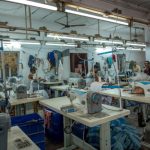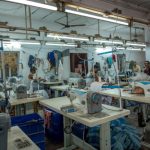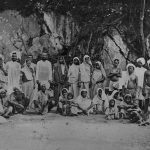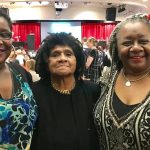Sydney Man Charged with Slavery Offences

A Sydney man has faced court over charges of possessing a slave, reducing a person to slavery and causing a person to enter into or remain in servitude.
The offences are alleged to have occurred between June 2013 and July 2015 in Maroubra in Eastern Sydney.
James Robert Davis, who served with the Australian Defence Force for 17 years, was arrested last week by the Australian Federal Police (AFP).
Open lifestyle
The 40-year old has always been open about his lifestyle, which includes polyamorous relationships with women, as well as BDSM – or bondage, discipline (or domination), sadism (or submission) and masochism – which often involves tying up a partner and giving and/or receiving pain.
“Patriarchal overlord”
Mr Davis once appeared in a documentary as the self-described leader of the “House of Cadifor”, calling himself the “patriarchal overlord”. All of his partners call him “master”.
“They must think I’m some kind of abusive oppressor, misogynist, manipulator or even a monster,” Mr David said in the documentary.
“But the truth is, I’m just a guy who enjoys both freedom and commitment and was lucky enough to find some incredible women to love and who loved me back.”
Over the weekend, the AFP raided the remote property where he lives with his partners, seizing several items as part of an ongoing investigation.
Five of his partners were there to support him in Armidale Local Court the next day.
Mr Davis was represented in court by barrister, Ian Lloyd QC, who made an application for bail on his client’s behalf.
In support of the application, Mr Lloyd submitted that “as strange as this case may be, it is defendable and it will be defended”, adding “there is no crime in lifestyle choices”.
Presiding Magistrate Vivien Swain ultimately refused bail and Mr Davis was remanded in custody.
He is scheduled to return to court in May.
Polyamory versus bigamy
A polyamorous relationship is one whereby a person is intimate with more than one partner.
Such relationships are not against Australian law.
However, being married to more than one person at the same time is known as bigamy and is an offence under section 92 of the Crimes Act 1900 (NSW) which carries a maximum penalty of 7 year in prison.
To establish the offence, the prosecution must prove beyond reasonable doubt that a person married another while he or she was legally married.
A person is not guilty of the offence if he or she is able to establish, ‘on the balance of probabilities’, that at the time of the subsequent marriage the first spouse had been ‘continually absent’ for 7 years.
A person is also not guilty in the event that the first spouse was living in New South Wales, that he or she was ‘continually absent’ from the state for 5 years and that the alleged bigamist believed, on reasonably grounds, that the first spouse was deceased.
The meaning of ‘continually absent’ is a matter of fact to be determined by the court.
Duress is a defence to the charge.
Bigamy is also an offence across Australia by virtue of section 94 of the Marriage Act 1961 (Cth), which prescribes a maximum penalty of 7 years imprisonment.
Slavery offences
Slavery is recognised by the law as a serious violation of an individual’s dignity and human rights.
Practices which exploit another person, including human trafficking, servitude, forced labour, debt bondage and forced marriage are all considered modern slavery and are serious crimes under the Criminal Code Act 1995 (Cth).
Modern slavery is not confined to far-off places. The Australian Institute of Criminology produced a report estimating that up to 1900 people were living in conditions of modern slavery in 2015-16 and 2016-17.
In 2019, a Sydney woman was found guilty in a NSW District Court of keeping two Thai women as slaves after they had voluntarily come to Australia as sex slaves.
The court heard she took their passports and forced the women to ‘pay off’ thousands of dollars in debt, exercising control over every aspect of their lives. She was sentenced to eight years, two months and 30 days’ imprisonment, with a non‑parole period of five years, two months and 29 days.
New South Wales
The Modern Slavery Bill was introduced into New South Wales parliament in 2018, after an inquiry by the Legislative Council Select Committee on Human Trafficking.
It has been passed by both Houses of Parliament, and will insert a new Division 17 into Part 10 of the NSW Crimes Act.
The new slavery offences will be embodied in sections 93AB and 93AC, within that division.
Section 93AB(1) will be the offence of ‘Slavery, servitude and child forced labour’, which is where a person:
- holds another person in slavery or servitude and the circumstances are such that the person knows or ought to know that the person is held in slavery or servitude, or
- requires a child to perform forced or compulsory labour and the circumstances are such that the person knows or ought to know that the child is being required to perform forced or compulsory labour.
The maximum penalty for the offence is 25 years’ imprisonment for 25 years.
Subsection (2) will make it clear that forced or compulsory labour does not include:
- work or service normally required of a child who is under detention because of a court order or who, under a court order of this or another jurisdiction, has been conditionally released from detention or ordered to perform work in the community, or
- work or service required because of an emergency threatening the New South Wales community or a part of the New South Wales community, or
- work or service that forms part of normal civil obligations.
Subsection (3) will state that regard may be had to all relevant circumstances when determining guilt or innocence.
Subsection (4) will provide that the following may be relevant in that regard:
- any of the person’s personal circumstances (such as the person being a child, the person’s family relationships, and any mental or physical illness) which may make the person more vulnerable than other persons,
- any work or services provided by the person, including work or services provided in circumstances which constitute exploitation,
- the coercion, threat or deception involved,
- without limiting paragraph (c), whether the person has been coerced, threatened or deceived into doing anything which involves the supply or sale of the person’s tissue (within the meaning of the Human Tissue Act 1983).
Under section (5), the consent of a person (whether an adult or a child) to any of the acts alleged to constitute holding the person in slavery or servitude, or requiring the child to perform forced or compulsory labour, will not preclude a determination that the person is being held in slavery or servitude, or the child is required to perform forced or compulsory labour.
Section 93AC will contain offences relating to ‘Child forced marriage’.
Under subsection (3), it would be an offence punishable by up to 9 years’ imprisonment to:
(a) cause a child to enter into a forced marriage, and
(b) intend to cause, or be reckless as to causing, that forced marriage.
Subsection (4) will prescribe the same maximum penalty for entering into a marriage with a child.
Those who are convicted of these offences will be subjected to prohibitions on engaging in certain types of conduct, any breach of which carries a prison sentence of up to two years and fine of up to $55,000.
The new laws will also prescribe fines of up $1.1 million for companies that:
- fail to prepare a modern slavery statement;
- fail to publish that statement publicly in accordance with the Regulations; and
- knowingly provide false and misleading information in a modern slavery statement.
Commonwealth Criminal Code
At present, section 270.3 of the Criminal Code Act 1995 (Cth), which applies throughout Australia, provides that:
(1) A person who, whether within or outside Australia, intentionally:
(a) possesses a slave or exercises over a slave any of the other powers attaching to the right of ownership; or
(b) engages in slave trading; or
(c) enters into any commercial transaction involving a slave; or
(d) exercises control or direction over, or provides finance for:
(i) any act of slave trading; or
(ii) any commercial transaction involving a slave;
is guilty of an offence.
Penalty: Imprisonment for 25 years.
(2) A person who:
(a) whether within or outside Australia:
(i) enters into any commercial transaction involving a slave; or
(ii) exercises control or direction over, or provides finance for, any commercial transaction involving a slave; or
(iii) exercises control or direction over, or provides finance for, any act of slave trading; and
(b) is reckless as to whether the transaction or act involves a slave, slavery or slave trading;
is guilty of an offence.
Penalty: Imprisonment for 17 years.
(3) In this section:
slave trading includes:
(a) the capture, transport or disposal of a person with the intention of reducing the person to slavery; or
(b) the purchase or sale of a slave.
(4) A person who engages in any conduct with the intention of securing the release of a person from slavery is not guilty of an offence against this section.
(5) The defendant bears a legal burden of proving the matter mentioned in subsection (4).
Slavery offences are also contained in section 268.10 (Enslavement as a Crime Against Humanity), 268.15 (Sexual Slavery as a Crime Against Humanity), 268.60 (Sexual Slavery as an International War Crime) and 268.83 (Sexual Slavery as a National War Crime).








